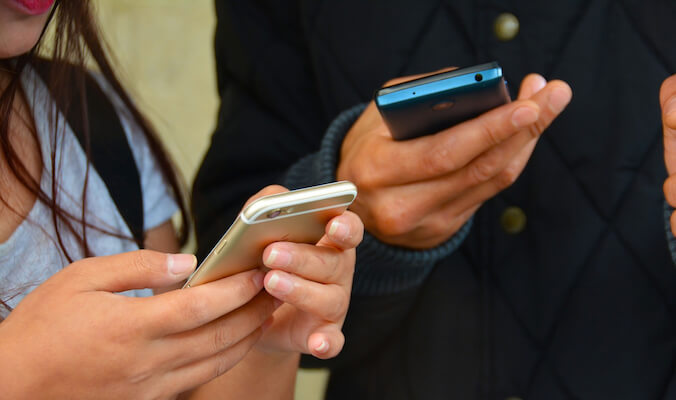Under The Bondage of The Smartphone

©
Homo digitalis and his smartphone. Always online, always available. This small and handy device has become an integral part of our everyday lives, enriching and simplifying it, helping us to communicate and inform ourselves. However, many people are on the verge of an addiction. A modern form of slavery.
Some facts and numbers
- According to a survey by the German newspaper “Computerwoche” last year 63% of the German population were owners of a smartphone. That amounts to about 44 million people.
- A study by the Federal Ministry of Health classifies some 2.5 million Germans between 14 and 64 years as “problematic Internet users”. 560,000 have a smartphone addiction – a very high number from a medical point of view.
- In average, we activate our smartphone 80 times a day. This was the result of a study done by the University of Bonn, where the phone usage of 60,000 study participants was analysed using the app “Menthal”. This means that every 18 minutes (!), we succumb to the urge to check our cell phone for new messages, calls or news.
- Overall, we use our smartphone just under three hours per day – of which we only use 10 minutes for actual phone calls. The majority of the time is spent browsing social media networks.
How to recognize a smartphone addiction
Scientists refer to the smartphone addiction as “NOMOPHOBIA” – derived from “No Mobile Phone Phobia”.
Do you feel restless, nervous, helpless, even break out in sweat if you forget your cell phone or your battery dies? Do you feel guilty or feel like you have to explain yourself when you are not readily available? You perceive phantom vibrations or ringing, although your phone is neither buzzing, beeping nor flashing? If so, then you show typical symptoms of a smartphone addiction.
The consequences
- We become ineffective.Those who constantly interrupt their work – even if briefly – and are busy on their phone fail to get into a proper workflow. No concentration. No productivity.
- We risk our health. Alexander Markowetz – assistant professor of computer science at the University of Bonn and co-initiator of the “Menthal” project – describes our use of the smartphone as “anti-Yoga”: “When practicing yoga, you take on an orthopedic correct position and focus the mind. When using a smartphone on the other hand people assume an orthopedically absurd posture and seek maximum distraction.” In 2014 the New Yorker spinal surgeon Kenneth Hansraj warned of the so-called “smartphone-neck”. Those who think that with homo errectus we have reached the end of evolution are clearly mistaken. Not to mention the risk for our eyesight…
- We lose sight of reality. Especially in waiting situations – at the train station or when we are expecting company at the café – we resort to swiping, clicking and liking. We hereby miss out on creative resting periods and the leisure of just observing what is around us: reality. And in even worse cases on the person we are with. A bad habit of the modern smartphone user.
Quick remedy
They do exist – simple ways on how we can trick ourselves into using the smartphone less often.
- Grayscale. Imagine Times Square in black and white. Not quite as attractive without the neon signs and brightly flashing billboards, is it? Using grey filters makes our display more boring – and that’s a good thing.
- The good old wristwatch. Instead of checking the time on your mobile phone – and while you’re at it just a “short glimpse” on your e-mails, WhatsApp, Facebook, Instagram, the weather for the afternoon, the appointments for tomorrow or for Pokémons in your area – just put on a wrist watch (and use it!).
- Do you own an alarm clock? If so, please dig it out again. If not, please buy one (and also use it!). And to give your smartphone in the room next door some rest as well, switch it off at a specified time in the evening and only turn it on again in the morning.
- Restricted zones. Set up spaces where the smartphone has no place, in the bedroom for example or at the dining table. At Lanserhof we coined the phrase “digital detox”. At the flip of a switch our guests can completely isolate themselves from the digital haze.
- Offline hours. The automatic glimpse on your mobile phone won’t reveal any news when it’s in offline mode. Besides, it saves energy. Define fixed offline hours, for example with the use of an offline app. It sounds paradox, but it works.
- Reflect upon the real values. Leave your cell phone in your pocket when meeting with friends and family. A real person always comes first. Always.
And the moral of the story? Simply re-read the last point of the above list…


